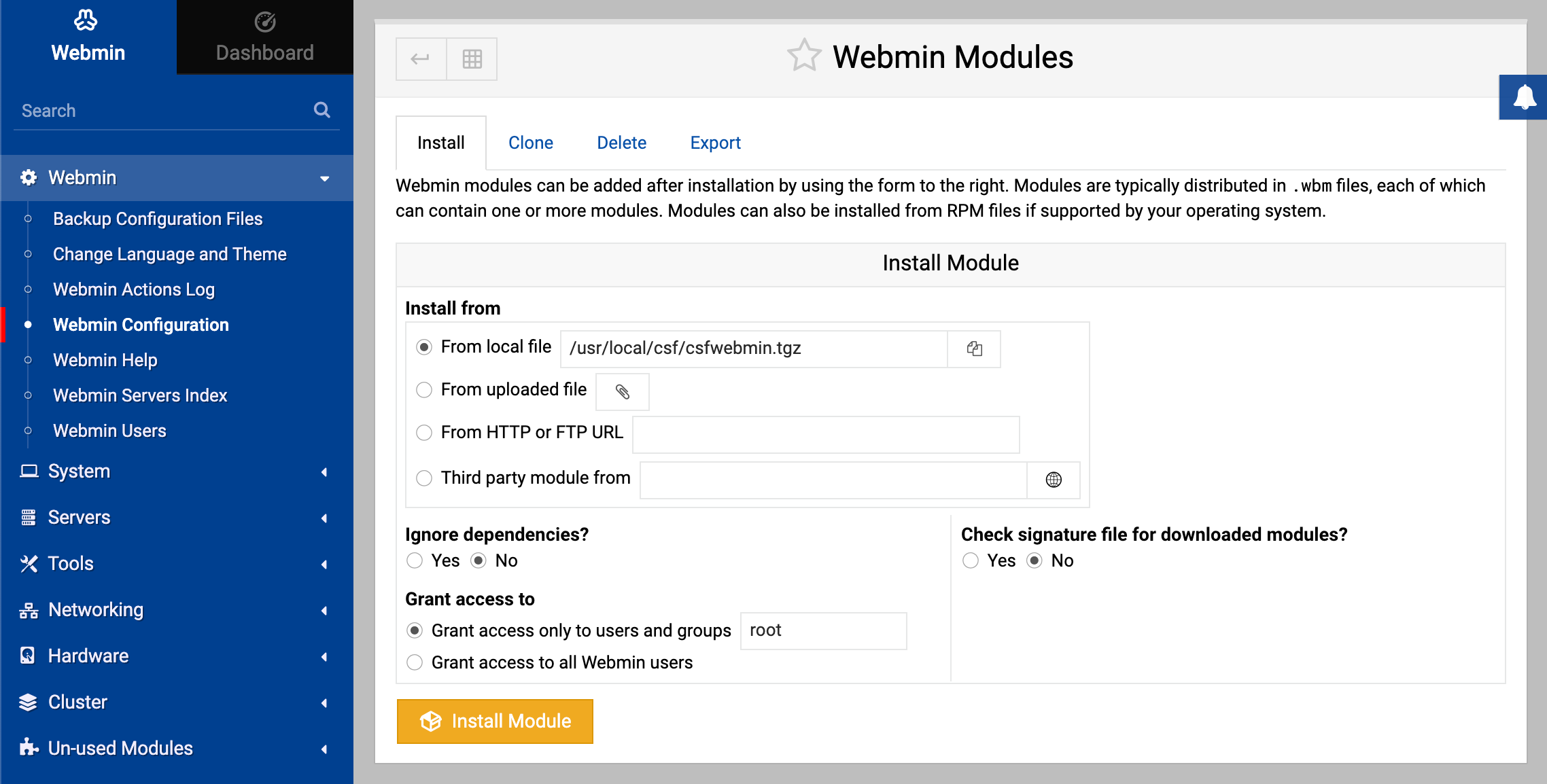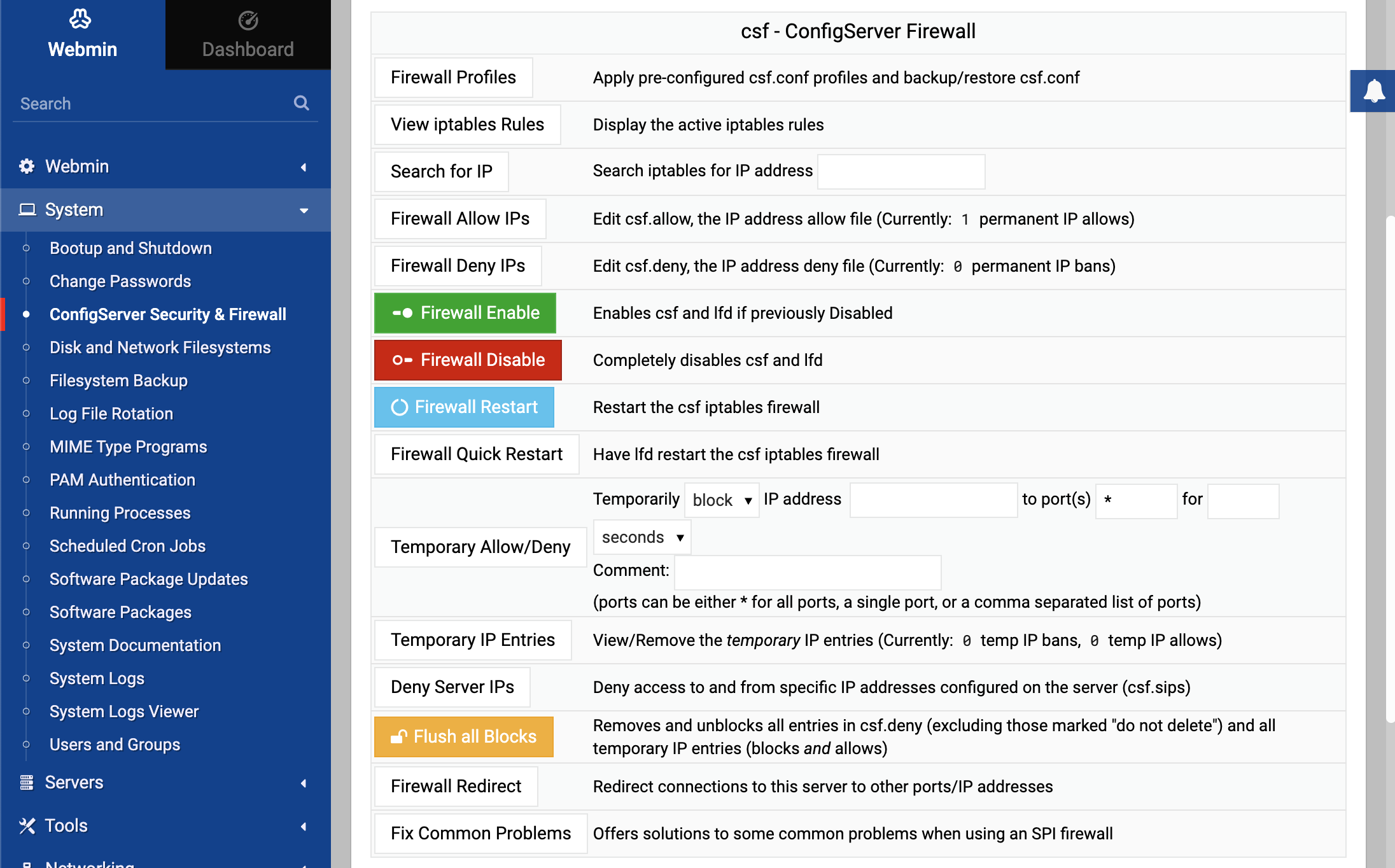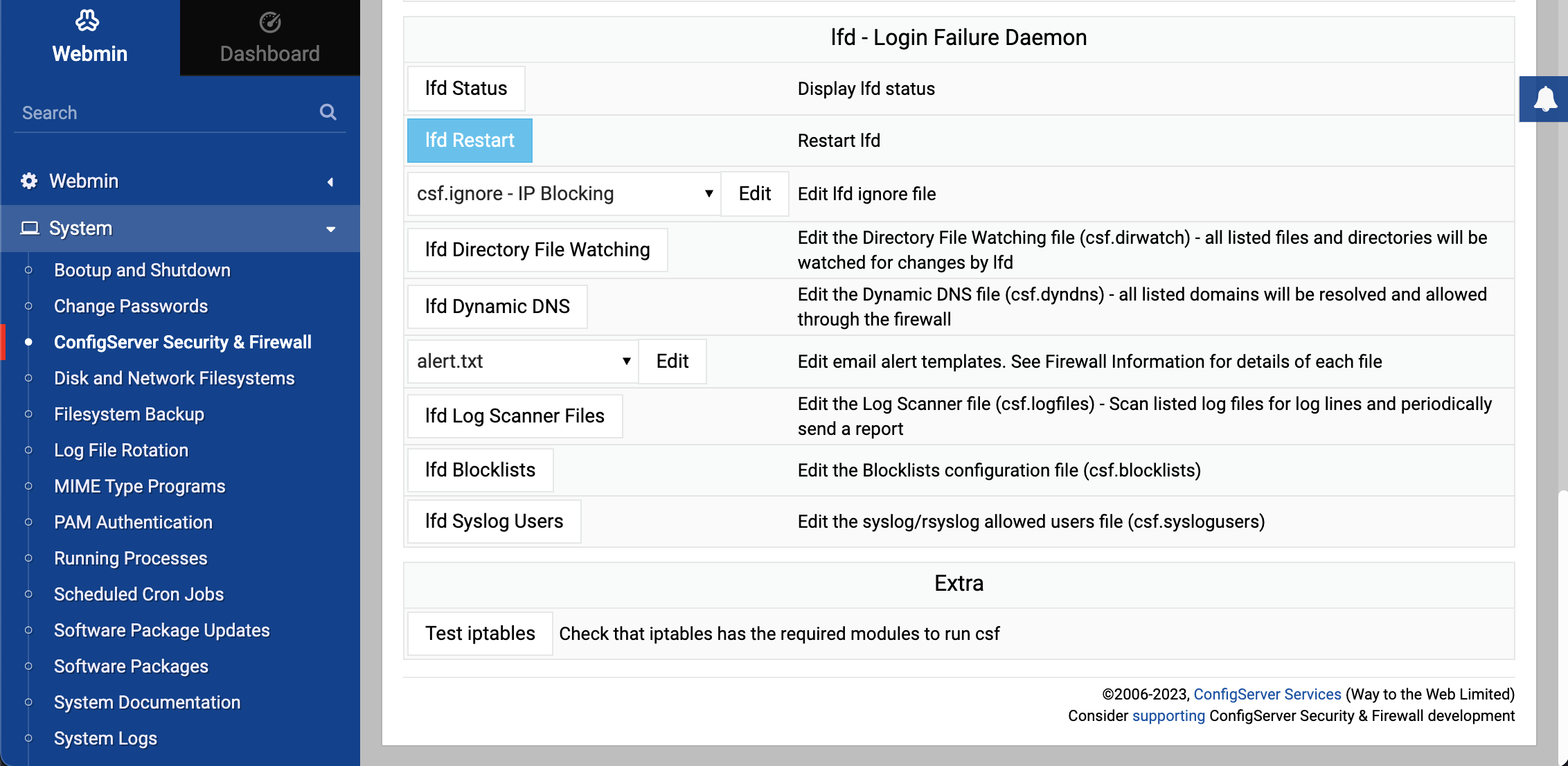About
A stateful packet inspection (SPI) firewall, login/intrusion detection and security application for Linux servers.
ConfigServer Security & Firewall is a third-party product that provides a Webmin module, which is not included in the default Webmin installation. You can install it on your system by following the instructions below.
Supported OS
Red Hat Enterprise Linux 7, 8 and 9
Rocky Linux 8 and 9
AlmaLinux 8 and 9
Fedora 30
CentOS Stream 8 and 9
CentOS 7
CloudLinux 7, 8 and 9
Debian 10 and 11
Ubuntu 18.04, 20.04 and 22.04
Any OS that is EOL will not be supported and newer versions may no longer work as new functionality is added.
Download
The latest version of ConfigServer Security & Firewall can be downloaded at official configserver.com website or using csf.tgz direct link. The latest sha256 checksums can also be downloaded.
Installation
To install ConfigServer Security & Firewall, you’ll need root access. The installation process is straightforward and consists of the following steps:
cd /usr/local/src
curl -O https://download.configserver.com/csf.tgz
tar -xzf csf.tgz
cd csf
./install.sh
After installation, you need to manually stop and disable Fail2Ban before proceeding with the ConfigServer Security & Firewall Webmin module installation.
To install the module:
- Navigate to Webmin ⇾ Webmin Configuration ⇾ Webmin Modules page.
- Select the From local file option.
- Choose
/usr/local/csf/csfwebmin.tgzfile. - Click Install Module as shown in the screenshot below.
Features
This product was developed to address the complexities and inefficiencies of other tools available for server security:
- Straight-forward SPI iptables firewall script
- Daemon process that checks for login authentication failures for:
- OpenSSH, Webmin
- Dovecot, Postfix, Proftpd
- Password protected web pages (htpasswd)
- mod_security failures (v1 and v2)
- Custom login failures with separate log file and regular expression matching
- POP3/IMAP login tracking to enforce logins per hour
- SSH login notification
- SU login notification
- Excessive connection blocking
- Outstanding Webmin UI integration
- Easy upgrade between versions from within the control panel
- Easy upgrade between versions from shell
- Auto-configures the SSH port if it’s non-standard on installation
- Block traffic on unused server IP addresses – helps reduce the risk to your server
- Alert when end-user scripts sending excessive emails per hour – for identifying spamming scripts
- Suspicious process reporting – reports potential exploits running on the server
- Excessive user processes reporting
- Excessive user process usage reporting and optional termination
- Suspicious file reporting – reports potential exploit files in
/tmpand similar directories - Directory and file watching – reports if a watched directory or a file changes
- Block traffic on a variety of Block Lists including DShield Block List and Spamhaus DROP List
- BOGON packet protection
- Pre-configured settings for Low, Medium or High firewall security
- Works with multiple ethernet devices
- Server security check – performs a basic security and settings check on the server
- Allow Dynamic DNS IP addresses – always allow your IP address even if it changes whenever you connect to the internet
- Alert sent if server load average remains high for a specified length of time
- mod_security log reporting (if installed)
- IDS (Intrusion Detection System) – the last line of detection alerts you to changes to system and application binaries
- SY flood protection
- Ping of death protection
- Port scan tracking and blocking
- Permanent and temporary (with TTL) IP blocking
- Exploit checks
- Account modification tracking – sends alerts if an account entry is modified, e.g. if the password is changed or the login shell
- Shared syslog aware
- Messenger service – allows you to redirect connection requests from blocked IP addresses to pre-configured text and HTML pages to inform the visitor that they have been blocked in the firewall. This can be particularly useful for those with a large user base and help process support requests more efficiently
- Country code blocking – allows you to deny or allow access by ISO Country Code
- Port flooding detection – per IP, per Port connection flooding detection and mitigation to help block DOS attacks
- lfd clustering – allows IP address blocks to be automatically propagated around a group of servers running lfd. It allows allows cluster-wide allows, removals and configuration changes
- Quick start csf – deferred startup by lfd for servers with large block and/or allow lists
- Distributed login failure attack detection
- Temporary IP allows (with TTL)
- IPv6 support with ip6tables
- System statistics – basic graphs showing the performance of the server, e.g. Load Averages, CPU Usage, Memory Usage, etc
- ipset support for large IP lists
- Integrated with the CloudFlare firewall
ConfigServer firewall (csf)
A comprehensive, straight-forward, and flexible SPI iptables firewall.
Login failure daemon (lfd)
A daemon that scans for login attempts against your server that continually fail within a short period of time, effectively blocking brute-force attacks.
Screenshots
Support
For support, please use the ConfigServer Community Forum. Direct support for the free scripts is not provided via helpdesk or email.
Licensing
The application is released under our script license. It’s free of charge, with no warranty.



